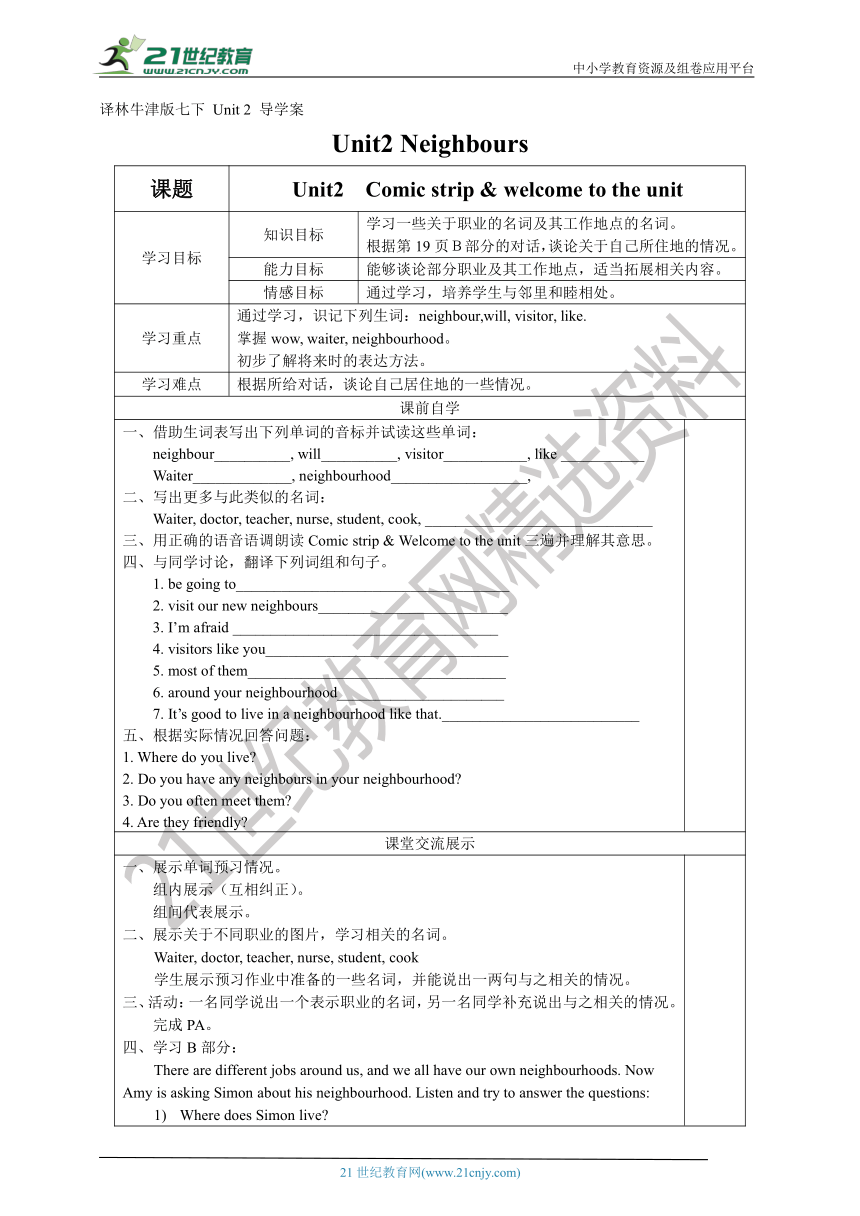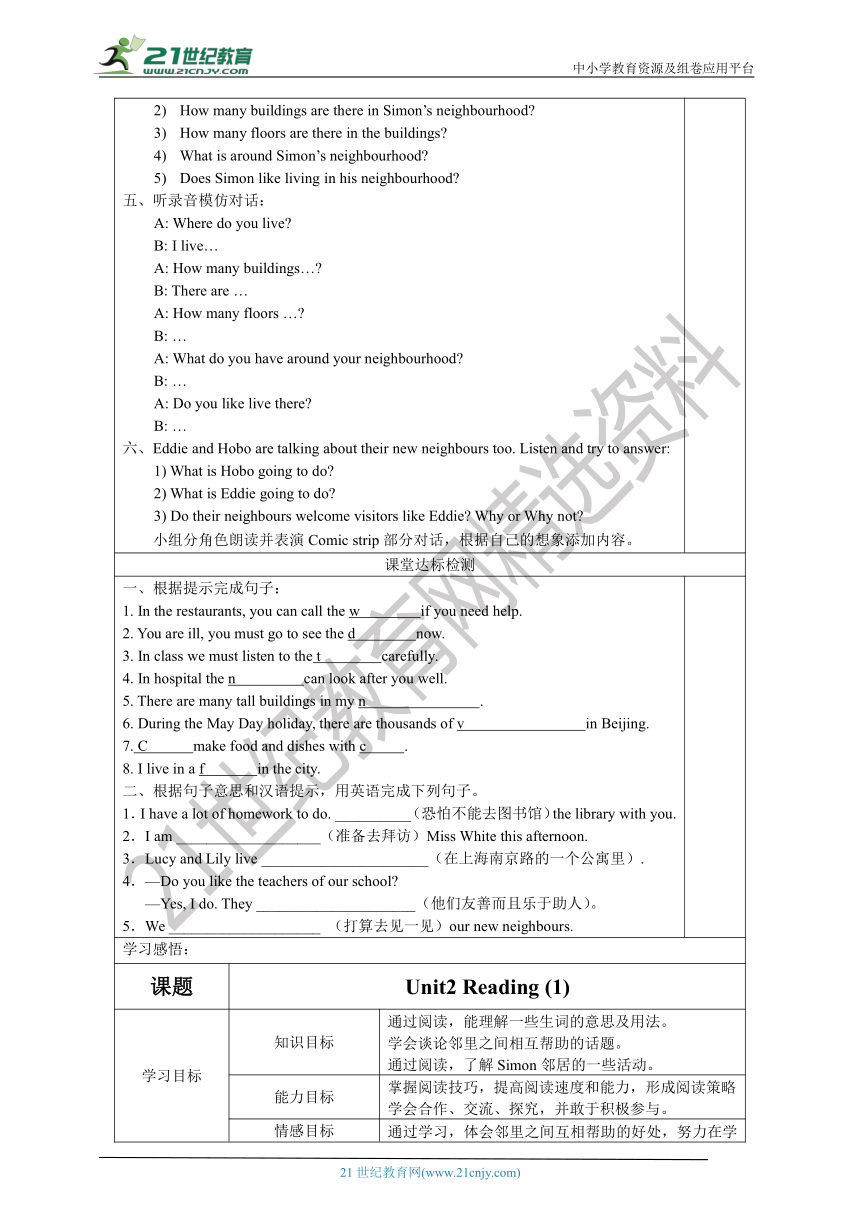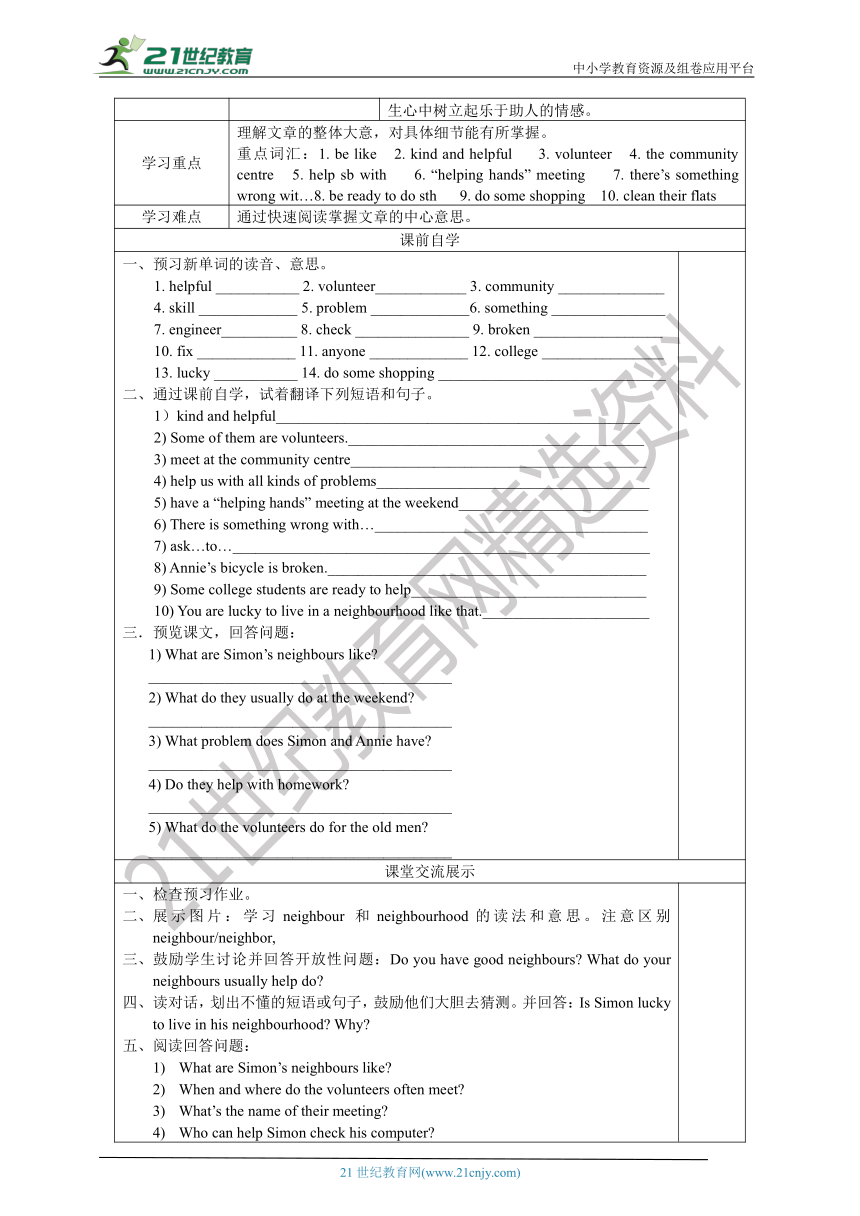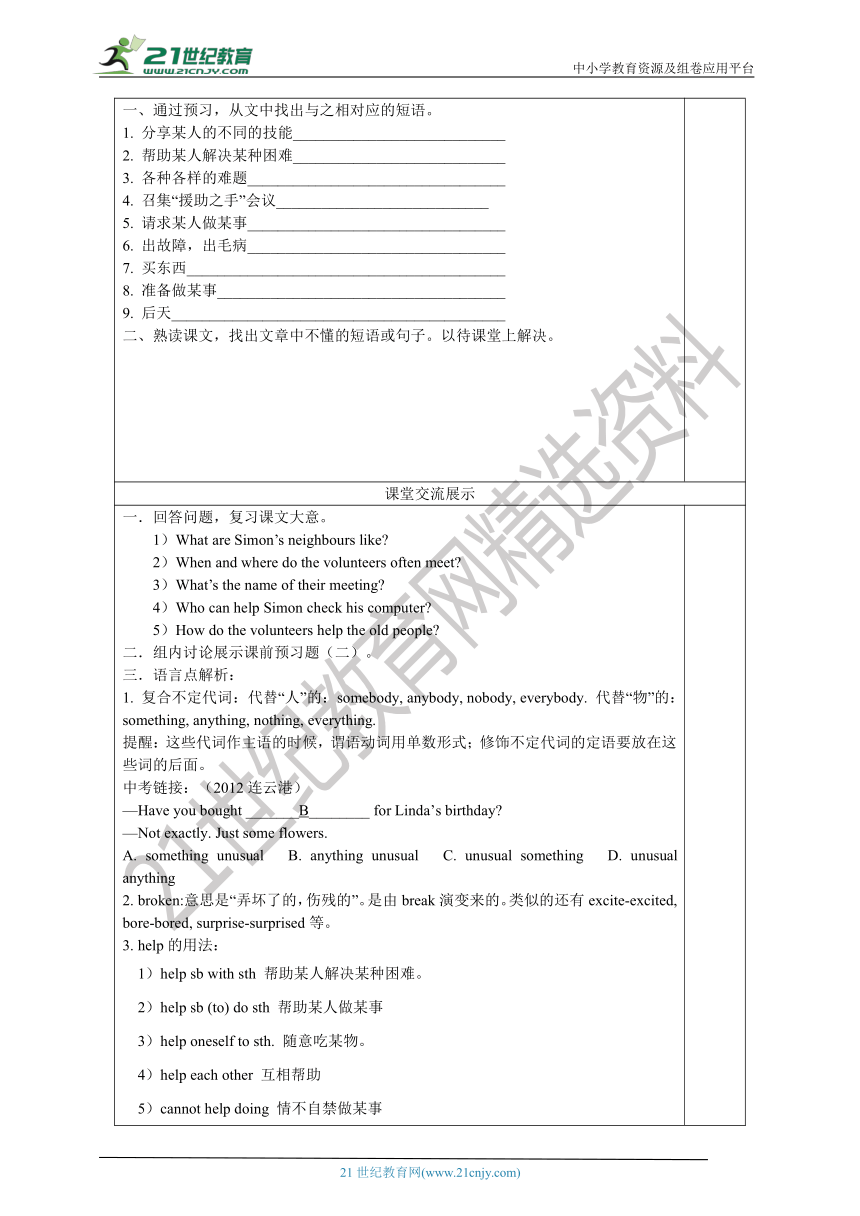Unit 2 Neighbours 单元导学案(含答案)
文档属性
| 名称 | Unit 2 Neighbours 单元导学案(含答案) |  | |
| 格式 | zip | ||
| 文件大小 | 1.3MB | ||
| 资源类型 | 试卷 | ||
| 版本资源 | 牛津译林版 | ||
| 科目 | 英语 | ||
| 更新时间 | 2019-05-26 11:44:42 | ||
图片预览





文档简介
中小学教育资源及组卷应用平台
译林牛津版七下 Unit 2 导学案
Unit2 Neighbours
课题 Unit2 Comic strip & welcome to the unit
学习目标 知识目标 学习一些关于职业的名词及其工作地点的名词。 根据第19页B部分的对话,谈论关于自己所住地的情况。
能力目标 能够谈论部分职业及其工作地点,适当拓展相关内容。
情感目标 通过学习,培养学生与邻里和睦相处。
学习重点 通过学习,识记下列生词:neighbour,will, visitor, like. 掌握wow, waiter, neighbourhood。 初步了解将来时的表达方法。
学习难点 根据所给对话,谈论自己居住地的一些情况。
课前自学
一、借助生词表写出下列单词的音标并试读这些单词: neighbour__________, will__________, visitor___________, like ___________ Waiter_____________, neighbourhood__________________, 二、写出更多与此类似的名词: Waiter, doctor, teacher, nurse, student, cook, ______________________________ 三、用正确的语音语调朗读Comic strip & Welcome to the unit三遍并理解其意思。 四、与同学讨论,翻译下列词组和句子。 1. be going to____________________________________ 2. visit our new neighbours_________________________ 3. I’m afraid ___________________________________ 4. visitors like you________________________________ 5. most of them__________________________________ 6. around your neighbourhood______________________ 7. It’s good to live in a neighbourhood like that.__________________________ 五、根据实际情况回答问题: 1. Where do you live? 2. Do you have any neighbours in your neighbourhood? 3. Do you often meet them? 4. Are they friendly?
课堂交流展示
一、展示单词预习情况。 组内展示(互相纠正)。 组间代表展示。 二、展示关于不同职业的图片,学习相关的名词。 Waiter, doctor, teacher, nurse, student, cook 学生展示预习作业中准备的一些名词,并能说出一两句与之相关的情况。 三、活动:一名同学说出一个表示职业的名词,另一名同学补充说出与之相关的情况。 完成PA。 四、学习B部分: There are different jobs around us, and we all have our own neighbourhoods. Now Amy is asking Simon about his neighbourhood. Listen and try to answer the questions: Where does Simon live? How many buildings are there in Simon’s neighbourhood? How many floors are there in the buildings? What is around Simon’s neighbourhood? Does Simon like living in his neighbourhood? 五、听录音模仿对话: A: Where do you live? B: I live… A: How many buildings…? B: There are … A: How many floors …? B: … A: What do you have around your neighbourhood? B: … A: Do you like live there? B: … 六、Eddie and Hobo are talking about their new neighbours too. Listen and try to answer: 1) What is Hobo going to do? 2) What is Eddie going to do? 3) Do their neighbours welcome visitors like Eddie? Why or Why not? 小组分角色朗读并表演Comic strip部分对话,根据自己的想象添加内容。
课堂达标检测
一、根据提示完成句子: 1. In the restaurants, you can call the w if you need help. 2. You are ill, you must go to see the d now. 3. In class we must listen to the t carefully. 4. In hospital the n can look after you well. 5. There are many tall buildings in my n . 6. During the May Day holiday, there are thousands of v in Beijing. 7. C make food and dishes with c . 8. I live in a f in the city. 二、根据句子意思和汉语提示,用英语完成下列句子。 1.I have a lot of homework to do. __________(恐怕不能去图书馆)the library with you. 2.I am ___________________(准备去拜访)Miss White this afternoon. 3.Lucy and Lily live ______________________(在上海南京路的一个公寓里). 4.—Do you like the teachers of our school? —Yes, I do. They _____________________(他们友善而且乐于助人)。5.We ____________________ (打算去见一见)our new neighbours.
学习感悟:
课题 Unit2 Reading (1)
学习目标 知识目标 通过阅读,能理解一些生词的意思及用法。 学会谈论邻里之间相互帮助的话题。 通过阅读,了解Simon邻居的一些活动。
能力目标 掌握阅读技巧,提高阅读速度和能力,形成阅读策略 学会合作、交流、探究,并敢于积极参与。
情感目标 通过学习,体会邻里之间互相帮助的好处,努力在学生心中树立起乐于助人的情感。
学习重点 理解文章的整体大意,对具体细节能有所掌握。 重点词汇:1. be like 2. kind and helpful 3. volunteer 4. the community centre 5. help sb with 6. “helping hands” meeting 7. there’s something wrong wit…8. be ready to do sth 9. do some shopping 10. clean their flats
学习难点 通过快速阅读掌握文章的中心意思。
课前自学
一、预习新单词的读音、意思。 1. helpful ___________ 2. volunteer____________ 3. community ______________ 4. skill _____________ 5. problem _____________6. something _______________ 7. engineer__________ 8. check _______________ 9. broken _________________ 10. fix _____________ 11. anyone _____________ 12. college ________________ 13. lucky ___________ 14. do some shopping ______________________________ 二、通过课前自学,试着翻译下列短语和句子。 1)kind and helpful________________________________________________ 2) Some of them are volunteers._______________________________________ 3) meet at the community centre_______________________________________ 4) help us with all kinds of problems____________________________________ 5) have a “helping hands” meeting at the weekend_________________________ 6) There is something wrong with…____________________________________ 7) ask…to…_______________________________________________________ 8) Annie’s bicycle is broken.__________________________________________ 9) Some college students are ready to help_______________________________ 10) You are lucky to live in a neighbourhood like that.______________________ 三.预览课文,回答问题: 1) What are Simon’s neighbours like? ________________________________________ 2) What do they usually do at the weekend? ________________________________________ 3) What problem does Simon and Annie have? ________________________________________ 4) Do they help with homework? ________________________________________ 5) What do the volunteers do for the old men? ________________________________________
课堂交流展示
检查预习作业。 展示图片:学习neighbour 和neighbourhood的读法和意思。注意区别neighbour/neighbor, 鼓励学生讨论并回答开放性问题:Do you have good neighbours? What do your neighbours usually help do? 读对话,划出不懂的短语或句子,鼓励他们大胆去猜测。并回答:Is Simon lucky to live in his neighbourhood? Why? 阅读回答问题: What are Simon’s neighbours like? When and where do the volunteers often meet? What’s the name of their meeting? Who can help Simon check his computer? How do the volunteers help the old people? 完成PB。 Group work. Ask students to work in a group of four and have a discussion about what they can do for their neighbours, then each group gives a report. A short report Dear classmates, we are middle school students now. we can do something for our neighbours. For the old, we can ____________________________________________________ ____________________________________________________________________ For the young, we can ______________________________________________________________________________________________________________________ We can also __________________________________________________________ ____________________________________________________________________ If we all help each other, ________________________________________________
课堂达标检测
一、根据提示完成句子。1) What are your _______________(邻居) like? 2) Most of my classmates are kind and _____________(乐于助人)。 3)Many ___________________(志愿者) often help the old do some shopping. 4) We often meet at the ______________(社区) centre and help each other. 5) We usually have a good time at the _____________(周末)。 6)I would like to be a ____________(工程师) when I grow up. 7) I can not lend my bike to you. It’s ______________(break). 8) We are so _____________(luck) to live in the neighbourhood. 9) You can go to your teachers if you have any ________________(问题)。10)We should learn all kinds of ___________(技能). They are helpful to us.
学习感悟:
课题 Unit2 Reading (2)
学习目标 知识目标 理解和运用文中的重要语言点。(词汇、句型)。 学会表达互相帮助的句子。
能力目标 能够对课文大意进行表述。
情感目标 培养互助互爱的情感。
学习重点 理解和运用文中的重点短语和句型。
学习难点 理解和运用文中的重点短语和句型。
课前自学
一、通过预习,从文中找出与之相对应的短语。 1. 分享某人的不同的技能____________________________ 2. 帮助某人解决某种困难____________________________ 3. 各种各样的难题__________________________________ 4. 召集“援助之手”会议____________________________ 5. 请求某人做某事__________________________________ 6. 出故障,出毛病__________________________________ 7. 买东西__________________________________________ 8. 准备做某事______________________________________ 9. 后天____________________________________________ 二、熟读课文,找出文章中不懂的短语或句子。以待课堂上解决。
课堂交流展示
一.回答问题,复习课文大意。1)What are Simon’s neighbours like? 2)When and where do the volunteers often meet? 3)What’s the name of their meeting? 4)Who can help Simon check his computer? 5)How do the volunteers help the old people?二.组内讨论展示课前预习题(二)。 三.语言点解析: 1. 复合不定代词:代替“人”的:somebody, anybody, nobody, everybody. 代替“物”的:something, anything, nothing, everything. 提醒:这些代词作主语的时候,谓语动词用单数形式;修饰不定代词的定语要放在这些词的后面。 中考链接:(2012连云港) —Have you bought _______B________ for Linda’s birthday? —Not exactly. Just some flowers. A. something unusual B. anything unusual C. unusual something D. unusual anything 2. broken:意思是“弄坏了的,伤残的”。是由break演变来的。类似的还有excite-excited, bore-bored, surprise-surprised等。 3. help的用法: 1)help sb with sth 帮助某人解决某种困难。 2)help sb (to) do sth 帮助某人做某事 3)help oneself to sth. 随意吃某物。 4)help each other 互相帮助 5)cannot help doing 情不自禁做某事 6)cannot help but…不得不…… 7)help sb out 帮助某人解决困难 中考链接:(2012江苏盐城) “Help __________(you) to some fish.”Lucy said to Aunt Amy politely.(yourself) 4. There is something wrong with…=Something is wrong with…表示“……有毛病;……出故障” 如:There is something wrong with my pen. Something is wrong with my pen 5. ready的用法:意为“有准备的,自愿的”。反义词为unwilling; unprepared. 常用的短语有:be ready to do sth“准备做某事,乐意做某事”;be ready for sth“为某事做准备”;get ready for sth.“为某事做好准备”四、翻译练习,巩固成果。 1. 我的自行车有问题。 ________________________________________________ 2. 他准备上学了。 ________________________________________________ 3. 他们正在为旅行做准备。 ________________________________________________ 4. 当这个孩子看见妈妈的时候,情不自禁地哭了起来。 ________________________________________________ 5. 孩子们,请随意吃些苹果。 ________________________________________________
课堂达标检测
一、句型转换。 1. Something is wrong with Mike’s old watch.(改为同义句) ______________________________________________________________________ 2. Nick is lucky to go to college.(改为同义句) ______________________________________________________________________ 3. Wang Hong wants to be a college student after her school.(对画线部分提问) ______________________________________________________________________ 4. Mr. Wei fixes the bicycle for us in the afternoon.(对画线部分提问) ______________________________________________________________________ 5. The little boy in red clothes is my new friend.(对画线部分提问) ______________________________________________________________________ 二、根据汉语提示,完成下列句子。 1. 我长大了也要当一名志愿者。 I _____________________________ when I grow up. 2. 你愿意帮助我们解决英语学习方面的困难吗? Would you like ________________________________ our English study? 3. 今天放学后以后,我打算去购物中心买东西。 I’m going to the shopping mall ___________________ after school today. 4. 我们乐意帮助他人解决各种各样的问题。 We __________________________ others with all kinds of problems. 5. 有人正在拜访老年人们,咱们去看一看他们是谁。 ___________________________ the old people. Let’s go and see who they are.
学习感悟:
课题 Unit2 Grammar
学习目标 知识目标 了解一般将来时的构成,并懂得一般疑问句和否定句的构成。 能够正确运用一般将来时的两种结构。即be going to do sth和will do sth
能力目标 能够运用一般将来时完成相应试题。 了解be going to 和will结构的区别。
情感目标 运用所学结构来谈论将来。培养学生做事的计划性。
学习重点 将来时的构成及其疑问句和否定句的构成,以及他们的回答方式。
学习难点 能够正确运用将来时的句子来谈论将来。
课前自学
通过预习了解下列单词和短语的意思。 shall______________ plate _____________ fire_______________ take an umbrella with sb______________________ wait for___________________________________ visit one’s new neighbour_____________________ watch a film next Friday______________________ see the doctor______________________________ the day after tomorrow_______________________ make a fire________________________________ cook some food____________________________ 小组讨论回答下列问题: 一般将来时的构成:______________________________________ 什么情况下用一般将来时?________________________________ 在英语中有哪些表示将来的时间短语? ________________________________________________________ ________________________________________________________ ________________________________________________________ ________________________________________________________
课堂交流展示
一、检查预习作业情况。 二、复习Reading部分的内容,展示一般将来时的句子。 分组抢答教师的(关于Reading)问题。 1) When are they going to have a “helping hands” meeting? 2) What is Simon going to ask a computer engineer to do? 3) Annie’s bicycle is broken, what is she going to do? 4) What will the volunteers do for the old people this weekend? 三、板书以上含有将来时的句子。并让同学们总结一般将来时的构成。 一般将来时的构成_________________________________ 四、关于一般将来时重点解析: 1. 一般将来时的意义:表示将要发生的动作或存在的状态。 2. 常表示将来的时间状语: Tomorrow, tomorrow morning/afternoon/evening, next week/month/term, in a few days/weeks/months/years… 3. 一般将来时的构成: Will, shall和be going to +动词原形。(shall只能用于第一人称) 4. will, shall和be going to 的区别: Will, shall用来表示将来要发生的动作或存在的状态。 Be going to 表示打算、准备、计划做的事或说话人认为短期内即将发生的动作。 5. 否定句的构成: 在will, shall后面加not; be going to 是在be后面加not. 6. 一般疑问句的构成: 将陈述句中的be, will, shall提到句首。几点注意:1. 在There be …句型用在一般将来时中,是把will或be going to 放在There和be之间。 如:There is going to be a class meeting tomorrow afternoon. 2. 表示位置移动的行为动词,如: come, go, leave, start(出发), arrive(到达)等,通常用现在进行时表示打算要做的事。 如:They are going on a study trip to New York We are leaving for Nanjing in a few days. 3. Be going to do sth与want to do sth的区别:前者表示近期的计划、打算,后者表示愿望、想法和要求。 如:He is going to buy a radio. 他打算买一台收音机。(言外之意是钱已备好,即将去买) He wants to buy a radio. 他想买一台收音机。(仅是愿望和想法) 五、小组合作完成AB部分相应练习。 六、按小组,每小组写一篇未来计划或打算,合理运用一般将来时。
课堂达标检测
一、动词填空。 1. Mr White ______________(take) you to Shanghai next month. I want to go with you. 2. There __________(not be) a new film in the cinema tomorrow evening. 3. -Where _____________ they _____________(dance) this afternoon? -At the school dancing club. 4. He ______________(come) to our school for a visit the day after tomorrow. 5. -Will you please ________________(not make) a fire in front of the classroom? -Sorry, I won’t. 二、根据所给汉语,用英语完成下列句子。 1. 怀特夫人将会带领我们参观公园。 Mrs White ________ _________ _________ ____________ the park. 2. 明天将会是晴天。 Tomorrow ______________ ___________ a sunny day. 3. 请你帮忙为我们的学习制订一个计划,好吗? _______ _______ _________ _________ us make a plan for our studies? 4. 我们去湖上划船,好吗? _________ we ___________ on the lake? 5. -下个星期天你打算做什么?-我打算去看一些有趣的地方。 ―What _______ you ______ ________ __________ next Sunday? ―I _______ ______ _______ _______ some interesting places.
学习感悟:
课题 Unit2 Integrated skills
学习目标 知识目标 学习表示职业的名词及与其对应的工作地点的名词。 能够正确拼读表示职业的名词。
能力目标 对部分职业能有所了解,并借此树立自己的工作理想。
情感目标 对职业贵贱能有更深层次的认识,不岐视任何一种工作。
学习重点 学习表示职业的名词。
学习难点 谈论与不同职业相关的情况。
课前自学
一、利用工具书或者小组内讨论,掌握下列知识。 (一)写出下列单词的音标和汉语意思。 1. postman ______________ _______________ 2. artist______________ _______________ 3. manager______________ _______________ 4. policeman______________ _______________ 5. company\______________ _______________ 6. restaurant______________ _______________ (二)将下列短语和句子译成汉语。 1. office worker__________________________________________ 2. police station__________________________________________ 3. post office__________________________________________ 4. in the town centre________________________________________ 5. a computer engineer_______________________________________ 6. in the future__________________________________________ 7. He works in a police station_________________________________ 8. What are you going to be in the future? ________________________ 9. I’m sure you’ll be good at it. ________________________________ 10. That sounds like a good idea. _______________________________
课堂交流展示
一、导入: T: Hi, boys and girls. Now, in the world, different people are doing different jobs indifferent places. You see, I’m teaching you English. So I am a teacher. While some are cooking in restaurants, they are cooks. What jobs do you like? What are you going to do in the future? Today we are going to talk about our future jobs. But first of all, let’s learn some English expressions of jobs. 二、展示部分图片(警察,邮递员,办公室工作人员,经理等) A: Look at the picture. What is his/her job? B: He is a policeman/a postman/an office worker/a manager. A: Where does he/she work? B: He works in a police station/post office/company/restaurant. 学生跟读,并表演对话。 Game time. 一名学生表演,其他同学猜出他/她的职业。 四、让学生猜一猜老师一家人的职业。 Say: Well, you are good guessers. Now let’s try Wendy. What are Wendy’s parents’ jobs? Do you know? Let’s listen to the tape and you can get the answers. (Play it twice or three times) 五、Finish Part A3. Now Millie is taking notes about Wendy’s family. Listen again and help Millie complete her notes. (Teach the skills of listening: 1. have a look at the notes, then we can know what information we want. 2. write down the first 2 or 3 letters while listening and complete them all after listening. 3. Check the answers.) 六、展示一些图画,并板书:a manager, an office worker, an policeman, a postman…(提醒学生注意冠词a与an的区别) 七、speak up We have known so many jobs. What is Wendy going to be in the future? Let’s listen to Speak up. We can know her classmates’ future jobs such as Millie’s. let’s listen. 八、A survey. Ask 3 of your classmates about their future jobs and why they want to have the jobs. Then complete the report on your paper.
课堂达标检测
中考链接: 1. There are about ten ________ working in the police station.(2012,潍坊) A. policeman B. policemen C. postman D. postmen 2. In order to find ______ better job, she planned to learn __________second foreign language.(2012·江苏苏州) A. the; a B. a; a C. the; the D. a; the3. A: _______ do you go to school every day? B: By bus. (2012·江苏宿迁) A. How B. Why C. Where D. When 4. It takes us about _________ hour to get to the Yangzhou-Taizhou Airport from Yangzhou by ___________ bus. (2012·江苏宿迁) A. an; a B. a; an C. an;/ D. a;/ 5. A: What are you ___________ when you grow up in the future? B: An actor. I want to play in films or plays. (2013·广安模拟) A. going to make B. going to be C. going to have
学习感悟:
课题 Unit2 Study skills
学习目标 知识目标 掌握部分单词的连读。 了解一些单词连读的规则。
能力目标 能流畅地读出一些单词的连读。
情感目标 训练学生的朗读英语的语音语调,培养他们学习英语的热情。
学习重点 学会单词的连读。
学习难点 会读并读准单词的连读。
课前自学
小组合作,快速准确地读出下列短语。 1. an apple 2. stand up 3. in an hour 4. there are 5. for us 6. here is 7. we enjoy 8. go out 9. the other 10. best time 11. sit down 12. a big cake
课堂交流展示
一、让一些学生先读一下课前预习中的短语,了解同学们的连读情况。 二、1)辅音结尾的单词后紧跟一个元音开头的单词: 如:an apple stand up in an hour (前面单词的辅音和后面单词开头的元音连读) 2)以r或者re结尾的单词,后面跟一个元音开头的单词。 如:there are for us here is (在两个单词之间加/r/) 3) 以元音结尾的单词和一个以元音开头的单词在一起。 如:we enjoy go out the other (在两个单词之间加/j/或/w/) 4) 以一个辅音结尾的单词和一个辅音开头的单词在一起。 如:best time sit down a big cake (省略前一个辅音) 三、针对以上规则,听读ABCD四个部分,体会其中的发音规则。 小组内合作交流,互相纠正。 四、试读下列短语和句子,注意连读规则: 1. come⌒on? 2. watch⌒out 3. what’s⌒up?? 4. come⌒in 5. shut⌒up? 6. hold⌒on 7. get⌒out? 8. forget⌒it 9. look⌒out? 10. wake⌒up 11.????Do you want⌒another cup⌒of coffee? 12.????I’d been smoking 5 cigarettes⌒a day before⌒I quit. 13.????What⌒if we can’t get⌒out of these troubles? 14.????Please feel free to⌒elaborate⌒on⌒anything you like. 15.????You’re⌒a highly respected⌒and very popular⌒attorney for the State.五、通过下面的小诗来巩固今天所学: - Who did you see? - I saw John. - John who? - John Brown. - I?can't hear you. - I said John Brown, John Brown, John Brown, - What did he say? - Who? John Brown? - Yes, What did he say? - He didn't say anything. - Nothing? - Not a word. - I?don't believe it. - I don't believe it. - Big Mouth John?Brown didn't say a word? -?Not a word. - I don't believe it. - I don't believe it.? - Big Mouth John?Brown didn't say a word? - Big Mouth John?Brown didn't say a word?
课堂达标检测
一、对划线部分提问,每空一词。1. My sister is an office worker. ___________ __________ your sister? 2. My mother is a policewoman. ________ ___________ your _________ __________? 3. Mike’s father is a bus driver. ________ _________ Mike’s father do? 4. The girl’s brother is a social worker? _______ _________ the girl’s brother do? 5. These students usually go to school by train. ________ ________ these students usually go to school? 二、根据汉语提示完成句子。 1.My father is a cook and he _______(工作在一家大饭店)near our school. 2.Liu Ying’s father is a policeman and he ______________________(他在警察局工作)far away from my home. 3. Miss Wang _____________(是一名英语教师) and she teaches in Sunshine Middle School. 4.―What are you going to do in the future?―I_______________(要当一名警察) when I grow up. 5.I_______________(当一名宇航员)like Liiu Yang when I grow up.
学习感悟:
课题 Unit2 Task
学习目标 知识目标 读懂关于“helping hands”meeting的内容,能掌握其关键,并能将其整合成一篇文章。
能力目标 复习本单元以Neighbour为主题的相关内容,并能运用所学知识进行恰当的表达。
情感目标 培养同学们乐于助人的情感,并从中学到一些邻里互助的方法。
学习重点 读懂布告牌,总结出每一块布告牌的中心意思。
学习难点 写一篇关于互相帮助的作文。
课前自学
一、预习生词:(要求能会读,并记住它们的汉语意思) 1. notice 2. information 3. below 4. better 5. anything 6. worry about 7 design 8. group 二、通读四块广告牌上的内容,并从中找出一个最关键的词或短语。 1. _________________________ 2. _________________________ 3. _________________________ 4. _________________________
课堂交流展示
一、检查课前预习第二题。并板书其最佳答案。1. _________________________ 2. _________________________ 3. _________________________ 4. _________________________ 二、分段阅读文章,并回答下列问题: (一)1. When is the “helping hands” meeting. 2. Why do they have the meeting? (二) What will the doctor do? (三) What can the engineers do? (四) When will you go to the Art and Design Group?三、再读四块广告牌上的内容,并完成Part B.然后组内核对答案。 四、调查:组内完成一项调查,主题是What are you going to be in the future? What will you do for your neighbour? 五、小组合作,完成一篇文章,内容包括:个人介绍,未来打算及如何为身边人服务。
课堂达标检测
写作: 根据所给提示,以“My Neighbour”为题,写一篇不少于60词的短文。 信息提示: 外貌特征:邻居叫王军,英文名字叫Jack,1.75米高,短头发,戴眼镜。 所在班级:在七年级3班。 个人爱好:喜欢打篮球,想成为一名篮球运动员。他经常帮助我们解决各种各样的问题,而且经常帮助我们完成家庭作业。 近期计划:下个星期,他将和我一起参观动物园,我们正期盼着那一天。 My Neighbour _____________________________________________________________________ _____________________________________________________________________ _____________________________________________________________________ _____________________________________________________________________ _____________________________________________________________________ _____________________________________________________________________ _____________________________________________________________________ _____________________________________________________________________
学习感悟:
Unit 2
第一课时
一?、1. waiter 2. doctor 3. teacher 4. nurse 5. neighbourhood 6. volunteers 7. cooks 8. flat
二、
1. I’m afraid I can’t go to
2. going to visit
3. in a flat on Nanjing Road in Shanghai
4. are kind and helpful
5. are going to meet
第二课时
一、1. neighbours 2. helpful 3. volunteers 4. community 5. weekend 6. engineer 7. broken
8. lucky 9. problems 10. skills
第三课时:
一、1. There is something wrong with Mike’s old watch.
2. It’s lucky for Nick to go to college.
3. What does Wang Hong want to be after her school?
4. What does Mr. Wei do for us in the afternoon?
5. Which boy is your new friend?
二、
1. want to be a policeman
2. to help us with any problems in
3. to do some shopping
4. are ready to help
5. Someone is visiting
第四课时:
一、1. will take 2. isn’t going to be/won’t be 3. will, dance 4. is coming/will come/is going to come
5. not make
二、1. will show us around 2. will be 3. will you please help 4. Shall…boat 5. are, going to do
6. are going to visit/see
第五课时:
1. B 2. D 3. A 4. C 5. B
第六课时:
一、1. What is 2. What does, mother do/What is, mother’s job 3. What does 4. What does 5. How do
二、1. works in a restaurant 2. works in a police station 3. is an English teacher 4. I want to be a policeman 5. I want to be an astronaut
第七课时:
略
21世纪教育网 www.21cnjy.com 精品试卷·第 2 页 (共 2 页)
HYPERLINK "http://www.21cnjy.com/" 21世纪教育网(www.21cnjy.com)
